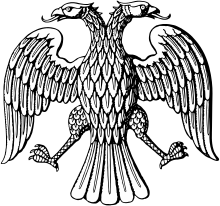| English: Worker's Marseillaise | |
|---|---|
| Рабочая Марсельеза | |
 | |
Former national anthem of the Russian Republic Former national anthem of the Russian SFSR (briefly, alongside The Internationale) | |
| Lyrics | Pyotr Lavrov |
| Music | Robert Schumann Claude Joseph Rouget de Lisle (arranged by Alexander Glazunov) |
| Adopted | 1917 |
| Relinquished | 1918 |
| Preceded by | "God Save the Tsar!" |
| Succeeded by | "The Internationale" |
| Audio sample | |
Worker's Marseillaise | |
The "Worker's Marseillaise"[a] is a Russian revolutionary song named after "La Marseillaise", the current national anthem of France. It is based on a poem of Pyotr Lavrov, first published on 1 July 1875 in London as "A New Song".[b] The poem reflects a radical socialist program and calls for the violent destruction of the Russian monarchy. At the end of 1875 or in 1876, this poem began to be sung in Russia to the melody of the last verse of Robert Schumann's song "Die beiden grenadiere". Schumann's melody is inspired by the original Marseillaise, but is noticeably different from it. Thus, the melody of the Worker's Marseillaise is only indirectly related to the original Marseillaise, and the lyrics not at all. The song is close to the cruel romance genre, and this influenced its popularity. The name the "Worker's Marseillaise" has been fixed since the 1890s.[1]
It existed alongside several other popular versions, among others a Soldier's Marseillaise and a Peasant's Marseillaise.[2]
This anthem was popular during the 1905 Russian Revolution and was used as a national anthem by the Russian Provisional Government until its overthrow in the October Revolution. It remained in use by Soviet Russia for a short time alongside "The Internationale".[3] During the 1917 Revolution it was played at all public assemblies, street demonstrations, concerts and plays.[2]
Cite error: There are <ref group=lower-alpha> tags or {{efn}} templates on this page, but the references will not show without a {{reflist|group=lower-alpha}} template or {{notelist}} template (see the help page).
- ^ Fakhretdinov, Rustam (2018). ""Russkaya marseleza": zhestokiy romans Petra Lavrova ["The Russian Marseillaise": A Cruel Romance of Pyotr Lavrov]". Antropologicheskij Forum. 14 (36): 117–153. doi:10.31250/1815-8870-2018-14-36-117-153.
- ^ a b Figes, p. 355
- ^ Soboleva N.A. (2005). "From the History of Domestic State Anthems" (PDF). National History (in Russian) (1): 10–12. Archived from the original (PDF) on March 25, 2009. Retrieved February 26, 2022